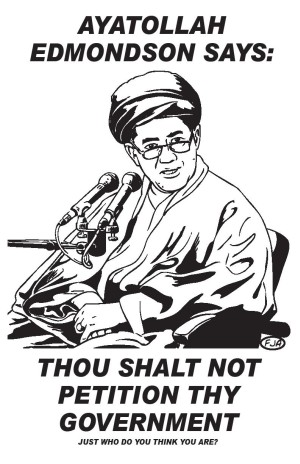Oklahoma Politics: June 2009 Archives
BREAKING NEWS: Gov. Brad Henry has vetoed HB 2246, the initiative petition reform bill to which Rick Carpenter alludes in the essay below, despite near unanimous support from the legislature. According to an e-mail press release from Oklahomans for Responsible Government late last night, "[Henry] claims that the provision that protects petition circulators from harassment is a violation of free speech."
 Rick Carpenter was one of three people indicted and handcuffed for their involvement in circulating the Taxpayer Bill of Rights initiative petition.
Rick Carpenter was one of three people indicted and handcuffed for their involvement in circulating the Taxpayer Bill of Rights initiative petition.
Rick and I were primary- and middle-school classmates, and his passion for politics was evident at an early age. (There are a couple of stories I could tell....) That early passion has endured.
After the legislature failed to approve Taxpayer Bill of Rights legislation, Rick led the effort to pass it by means of initiative petition. The number of required signatures combined with the short window of time to gather them makes it difficult to get a petition circulated without the help of paid circulators, particularly if your volunteer circulators are subject to harassment from members of groups that feel threatened by the petition. TABOR supporters hired a firm with previous success circulating petitions in Oklahoma. They brought in circulators from out of state, just as supporters of the ban on cockfighting had done in 2002.
But TABOR and a companion petition against eminent domain abuse were unpopular with those groups and businesses dependent on government funding and with the government officials who enjoy the power of doling that funding out. TABOR petitions were disqualified on the grounds that some of the circulators were not bona fide residents of Oklahoma. The State Supreme Court ruled against the petition but refused to hear oral arguments, and the TABOR initiative was thrown off the ballot. That would be enough of a setback, but officials went further and sought indictments of Rick Carpenter, Susan Johnson, head of the petition circulating firm, and Paul Jacob, a consultant on initiative campaigns.
The Oklahoma 3 were indicted and handcuffed in court, just for the cameras. At length, the Federal 10th Circuit Court of Appeals ruled that the 1969 law, under which the Oklahoma 3 were the first to be indicted, violated the 1st and 14th amendments to the Constitution. After first announcing plans to pursue the case to the U.S. Supreme Court, Edmondson dropped the charges on January 22, 2009, the day after the 10th Circuit refused Edmondson's appeal.
Rick has written a powerful essay on his experience and its significance for democracy in Oklahoma, and with his permission, it's appearing here on BatesLine. An excerpt:
The Attorney General, his political cronies, bigwig CEOs and labor unions, the Oklahoma axis of evil, were not content to defeat these two petitions. They wanted to make people fearful to participate in the petitions process. They knew the issues were popular among voters and it was just a matter of time before another petition got on the ballot. Clearly, the opposing long-term strategy was to make examples of us so Oklahomans would think twice before asserting their free speech. They want to intimidate citizens, like me, from sponsoring future petitions and out-of-state consultants, like Paul and Susan, from daring to do business in Oklahoma.While they would never be able to remove initiative petition rights from the Constitution, they can use the law to make life very difficult on anyone who chooses to circulate a petition that the power structure does not like. I found myself the target of an angry and vengeful government, determined to tell the people of Oklahoma, "Don't you dare come between the government and your money or property".
By filing charges and threatening us with 10 years in prison, the Attorney General knew he would cause a chilling effect on petitioning in Oklahoma. All petitions face validity questions: some people sign more than once, some people sign who are not eligible, some people sign up under a name like "Clark Kent". The verification and challenge process is supposed to weed out those occurrences. If petition proponents fear facing criminal charges at each instance, nobody will be willing to sponsor a petition. Edmondson, the corporate CEOs funding his governor's campaign and labor unions endorsing him, would maintain control of ever-increasing amounts of taxpayer money and unfettered ability to seize private property.
Following our arraignment we were all three curiously handcuffed together, I suppose to keep us all in camera frame, and "perp walked", Rudy Giuliani style, out of the courtroom before a crush of cameras and reporters. The message was clear; this is what happens to you if you dare to circulate a petition that challenges the status quo.